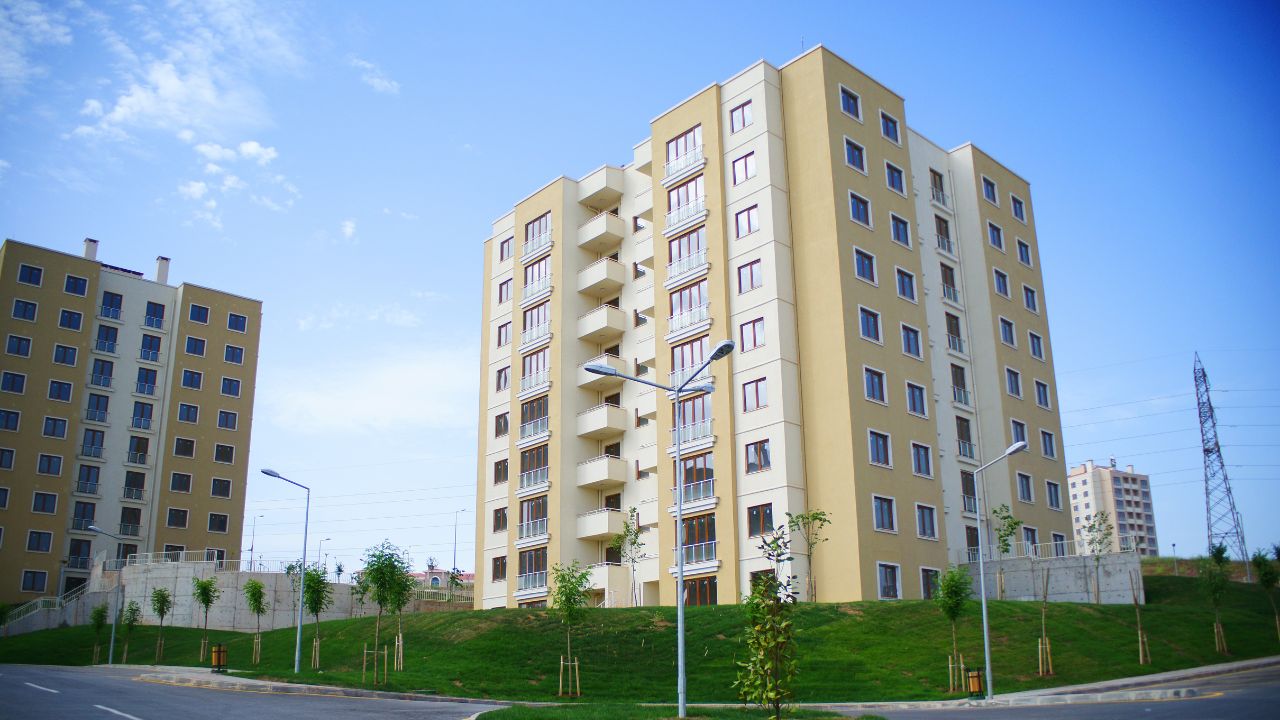Electrical Cost Estimator in Jacksonville, FL
At Estimate Florida Consulting offers comprehensive electrical cost estimation services in Jacksonville. Our estimates range from $150,000 to $220,000 for the entire project, with a cost per square foot ranging from $3.50 to $8. Our team utilizes advanced techniques and industry expertise to provide accurate assessments tailored to your specific needs. Whether you’re planning a residential or commercial project, we ensure transparent and reliable estimates to help you budget effectively. With a commitment to precision and efficiency, Estimate Florida Consulting is your trusted partner in navigating the complexities of electrical cost estimation, ensuring your project stays within budget constraints while maintaining quality standards.
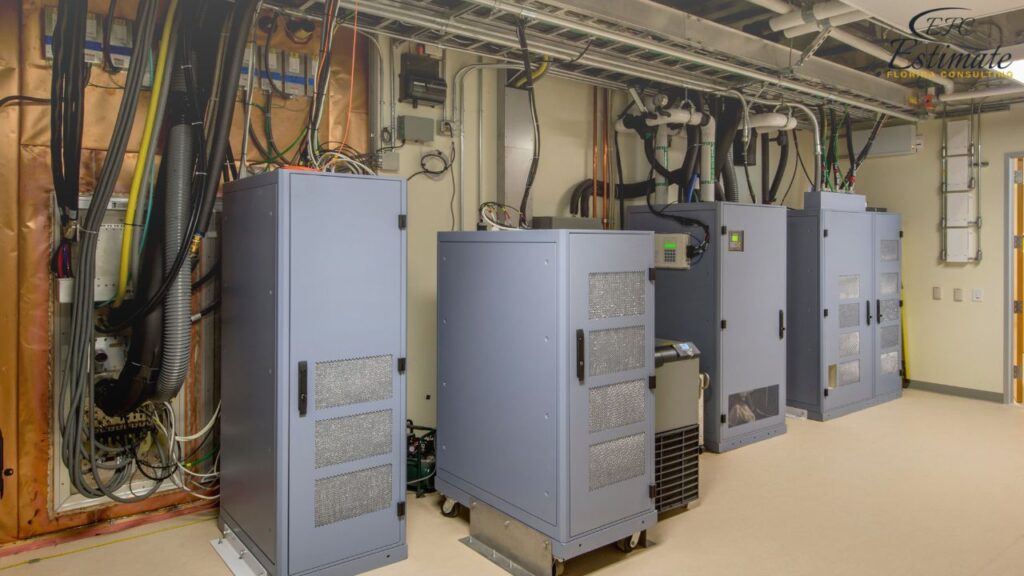
We Work for All Construction Trades
Construction trades encompass a variety of specialized roles, each critical to the successful completion of a project. Skilled tradespeople not only ensure the work is done right but also enhance safety, efficiency, and compliance with local building codes. From the initial groundwork to the final touches, every step requires expertise from dedicated professionals.
Electrical Breakdown Cost
The breakdown cost for the Electrical Cost Estimator project in Jacksonville includes labor, materials, equipment rentals, and overhead expenses. Labor costs encompass skilled electricians’ wages, while materials involve wiring, fixtures, and other components essential for the project’s completion.
Expense Item | Cost |
Material Costs | $80,000 |
Labor Costs | $90,000 |
Equipment Rental | $10,000 |
Permits and Licenses | $8,000 |
Contingency | $22,000 |
90% More Chances to Win Projects With Our Estimate!
- Multi-Family Building
- Hotel Building
- Hospital Building
- Warehouse Building
- School & University Building
- High-Rise Building
- Shopping Complex
- Data Center Building

Get Acquainted with Electrical Installations
Electrical House Wiring
HVAC Installation
Electrical Wiring of 3 Storey House
Cost of Electrical Wiring Based on Type
Considering the financial implications of electrical installations is essential. In new constructions, where wiring is integrated from the outset, costs tend to be more economical, typically ranging from $3 to $5 per square foot. Conversely, rewiring existing homes entails a more complex and expensive procedure, with prices varying from $6 to $10 per square foot. These cost differentials reflect the labor-intensive nature and stringent adherence to safety standards demanded by contemporary electrical installations.
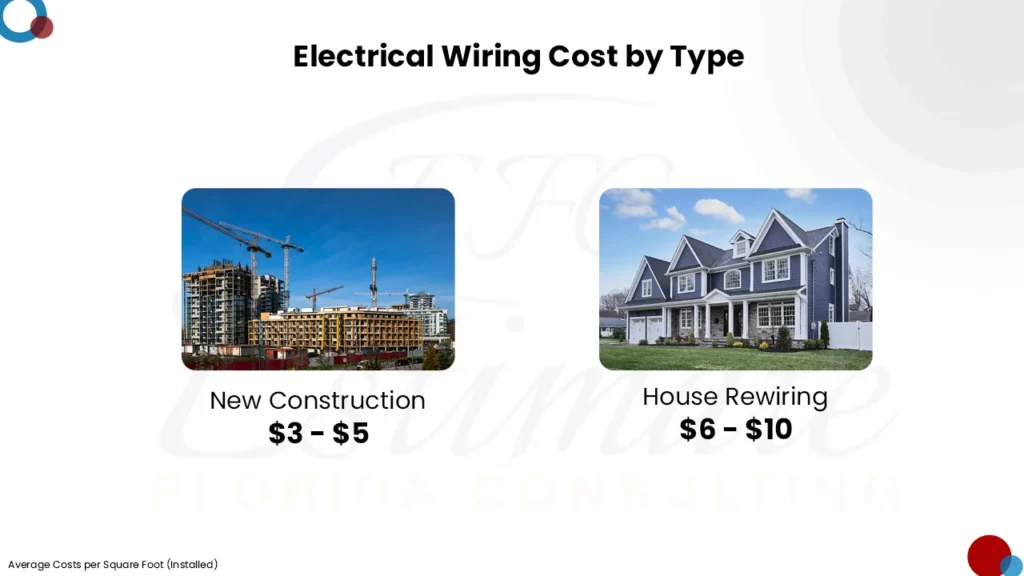
WIRING TYPE | COST PER SQUARE FOOT (INSTALLED) |
New Construction | $3 to $5 |
House Rewiring | $6 to $10 |
Exploring the Electrifying World
Electrical Resistors: Resistors are passive two-terminal components that resist the flow of electric current. They are commonly used to control the amount of current in a circuit, limit voltage, divide voltages, and terminate transmission lines. Resistors come in various types including fixed resistors, variable resistors (potentiometers), and specialized resistors like thermistors and varistors.
Capacitors: Store electrical energy in an electric field. They consist of two conductive plates separated by an insulating material called a dielectric. Capacitors are used in filtering, smoothing power supplies, timing circuits, coupling and decoupling signals, and energy storage in electronic devices.
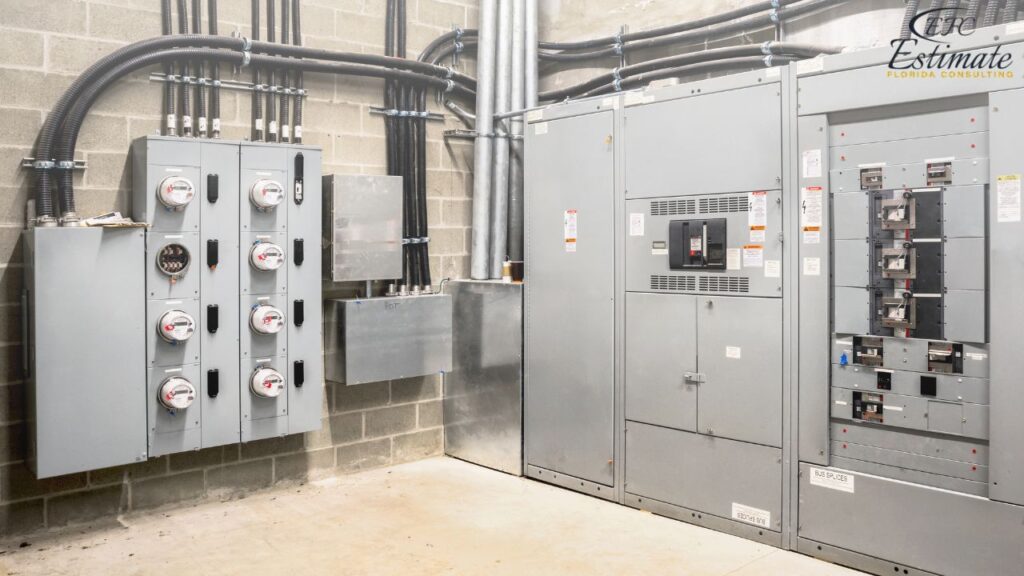
Inductors: Are passive components that store energy in a magnetic field when current flows through them. They consist of a coil of wire wound around a core material. Inductors are used in filters, oscillators, transformers, and inductance-based sensors. They oppose changes in current flow, causing them to exhibit properties like self-inductance and mutual inductance.
Diodes: Are semiconductor devices that allow current to flow in one direction while blocking it in the opposite direction. They are fundamental components in rectifier circuits, allowing AC to be converted to DC, as well as in signal demodulation, voltage regulation, and switching applications. Common types of diodes include rectifier diodes, Zener diodes, and light-emitting diodes (LEDs).
Transistors: Are semiconductor devices used to amplify or switch electronic signals and electrical power. They consist of three layers of semiconductor material and can be either bipolar junction transistors (BJTs) or field-effect transistors (FETs). Transistors are essential in amplifiers, oscillators, digital logic circuits, and voltage regulators, playing a crucial role in modern electronics.
Relays: Are electrically operated switches that use an electromagnet to mechanically control the flow of current in a circuit. They are used to control high-power devices with low-power signals, isolate circuits, and provide electrical isolation between two circuits. Relays find applications in automation, automotive systems, industrial control, and telecommunications.
Integrated Circuits (ICs): Are miniature electronic circuits consisting of semiconductor devices and passive components fabricated on a single semiconductor substrate. They can contain thousands to billions of transistors and other components, interconnected to perform complex functions. ICs are the backbone of modern electronics, used in microprocessors, memory chips, amplifiers, and various other applications.
Transformers: Are passive electrical devices that transfer electrical energy between two or more circuits through electromagnetic induction. They consist of two or more coils of wire (windings) wrapped around a magnetic core. Transformers are used to step up or step down voltage levels, isolate circuits, match impedance, and provide galvanic isolation in power supplies, electrical distribution systems, and signal processing circuits.
Voltage Regulators: Are electronic circuits or devices used to maintain a constant voltage level in electrical circuits, regardless of variations in input voltage or load current. They ensure stable and regulated power supply to sensitive electronic components. Voltage regulators are commonly found in power supplies, voltage stabilizers, battery chargers, and voltage reference circuits.
Sensors: Are devices that detect and respond to physical or environmental stimuli, converting them into electrical signals. They play a crucial role in measurement, control, and monitoring systems across various industries. Types of sensors include temperature sensors, pressure sensors, proximity sensors, motion sensors, light sensors, and many others, each serving specific applications in fields like automotive, aerospace, healthcare, and consumer electronics.
- Multi-Family Building
- Hotel Building
- Hospital Building
- Warehouse Building
- High-Rise Building
- Shopping Complex
Electrical Types | Cost |
Electrical Resistors | $0.50 – $3.00 per square foot |
Capacitors | $0.50 – $5.00 per square foot |
Inductors | $1.00 – $7.00 per square foot |
Diodes | $1.00 – $5.00 per square foot |
Transistors | $2.00 – $10.00 per square foot |
Relays | $3.00 – $15.00 per square foot |
Integrated Circuits (ICs) | $10.00 – $30.00 per square foot |
Transformers | $20.00 – $50.00 per square foot |
Voltage Regulators | $12.00 – $20.00 per square foot |
Sensors | $7.00 – $15.00 per square foot |
Factors Influencing Electrical
Several factors influence the cost of electrical components, including market demand, raw material prices, technological advancements, and supply chain disruptions. Market demand plays a significant role, with high demand leading to increased prices due to competition among buyers. Fluctuations in the prices of raw materials, such as copper and silicon, can also impact costs as these materials are essential for manufacturing electrical components. Additionally, advancements in technology may introduce more efficient or specialized components, which could affect pricing. Supply chain disruptions, such as natural disasters or geopolitical tensions, can lead to shortages and price volatility.

Overall, a combination of these factors contributes to the dynamic nature of electrical component costs in the market.
Project Objective
The objective of the Electrical Cost Estimator project in Jacksonville is to provide stakeholders with a comprehensive tool for estimating the costs of electrical components per square foot in the region. By compiling data on various types of electrical components including resistors, capacitors, inductors, diodes, transistors, relays, integrated circuits (ICs), transformers, voltage regulators, and sensors, the aim is to offer insights into the financial aspects of electrical projects. This tool will assist engineers, contractors, and project managers in budgeting and planning for electrical installations and upgrades within the Jacksonville area. Moreover, it seeks to enhance decision-making processes by providing reliable cost estimates based on market trends and industry standards, thereby facilitating efficient resource allocation and project management.
Download Template For Electrical Project Breakdown
- Materials list updated to the zip code
- Fast delivery
- Data base of general contractors and sub-contractors
- Local estimators

Price Variation of Electrical Outlets by Type
Electrical outlets are available in various styles, capacities, and features, with prices ranging from approximately $1 to $80. A wide range of outlet types is accessible for installation, some of which are necessary for specific appliances. Choosing the wrong outlet type could lead to appliance malfunctions or even pose fire hazards. Additionally, using an incompatible unit might void warranties for appliances or lighting fixtures. Furthermore, certain plugs come with a varying number of prongs, requiring the correct number of corresponding openings.
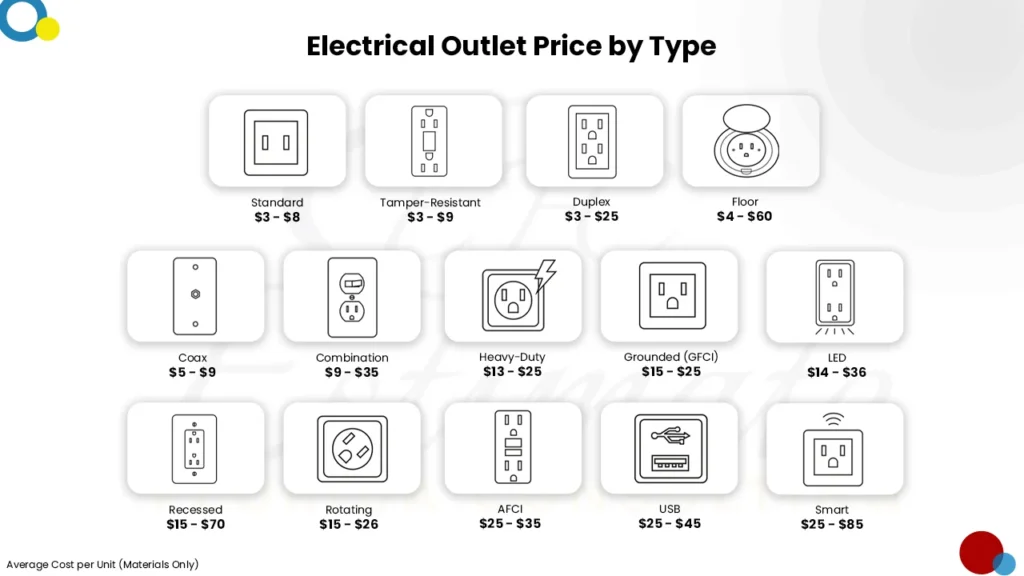
Type | Average Cost per Unit (Materials Only) |
Standard | $3 – $8 |
Tamper-Resistant | $3 – $9 |
Duplex | $3 – $25 |
Floor | $4 – $60 |
Coax | $5 – $9 |
Combination | $9 – $35 |
Heavy-Duty | $13 – $25 |
Grounded (GFCI) | $15 – $25 |
LED | $14 – $36 |
Recessed | $15 – $70 |
Rotating | $15 – $26 |
AFCI | $25 – $35 |
USB | $25 – $45 |
Smart | $25 – $85 |
Business Finance Loan
Find out if you're pre-qualified in seconds

Get Prequalified Now
IMPORTANT: Make sure the email and phone number you enter are correct. We will email and text you a link to get started.
Key Components and Methodology
The Electrical Cost Estimator project in Jacksonville encompasses several key components and a robust methodology to deliver accurate cost estimations. Firstly, extensive research is conducted to gather data on the prices of various electrical components including resistors, capacitors, inductors, diodes, transistors, relays, integrated circuits (ICs), transformers, voltage regulators, and sensors. Market trends, supplier quotations, and historical data are analyzed to establish a comprehensive database. The methodology involves categorizing components, determining average costs, and accounting for factors like quality, quantity, and supplier location. Statistical techniques may be employed to calculate cost ranges and account for variability. Additionally, regular updates and validation processes ensure that the estimator remains current and reliable. User-friendly interfaces and documentation are developed to facilitate easy access and utilization of the estimator by stakeholders involved in electrical projects within the Jacksonville region.
Electrical Wiring Cost by Type of System
Various electrical wiring systems are tailored to meet the unique requirements of diverse construction projects. Lead-sheathed wiring stands out for its exceptional durability, offering robust protection against adverse conditions, making it a preferred choice for challenging environments. Conduit wiring, on the other hand, features wires safely enclosed within conduits, prized for its flexibility and straightforward maintenance. Both systems play pivotal roles in ensuring the safe and efficient distribution of electrical power within a building. Choosing between lead-sheathed and conduit wiring entails careful consideration of specific building codes, project demands, and environmental factors, empowering contractors to determine the most suitable approach for each individual scenario.
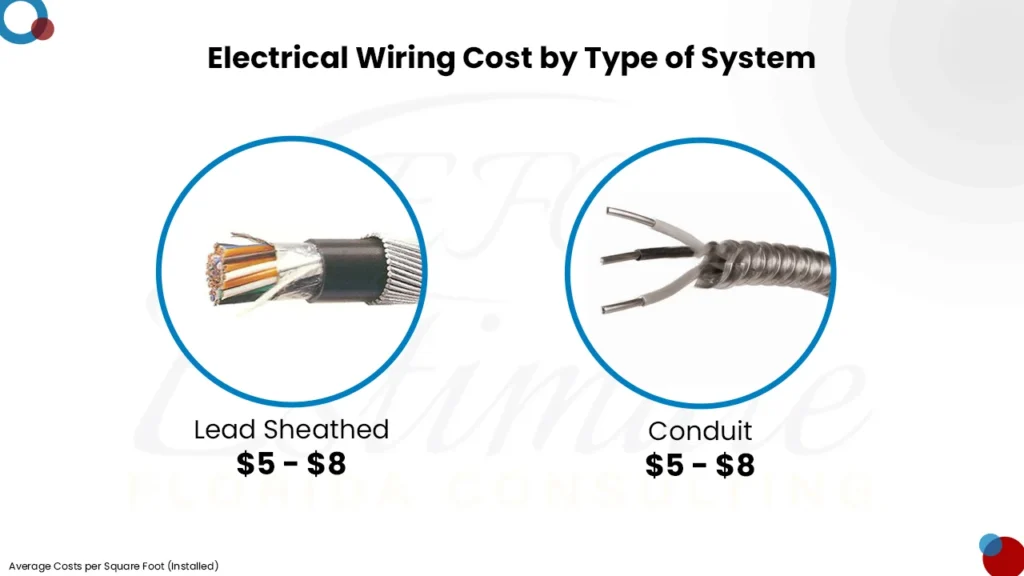
WIRING SYSTEM | INSTALLED COST RANGE PER SQUARE FOOT |
Lead Sheathed | $5 to $8 |
Conduit | $5 to $8 |
Factors Affecting Cost Estimates
Factors influencing cost estimates in the Electrical Cost Estimator project in Jacksonville include market demand, raw material prices, technological advancements, supply chain disruptions, and regional economic conditions.
Materials Cost
Estimate Florida Consulting provides services to estimate the materials cost for the Electrical Cost Estimator project in Jacksonville. With a budget of $80,000, our team factors in various elements such as market fluctuations, raw material expenses, and local economic conditions to generate accurate estimates. By closely monitoring market demand and technological advancements, we ensure our estimates are up-to-date and reflective of current industry standards. Additionally, we consider supply chain disruptions and regional factors that may impact costs.
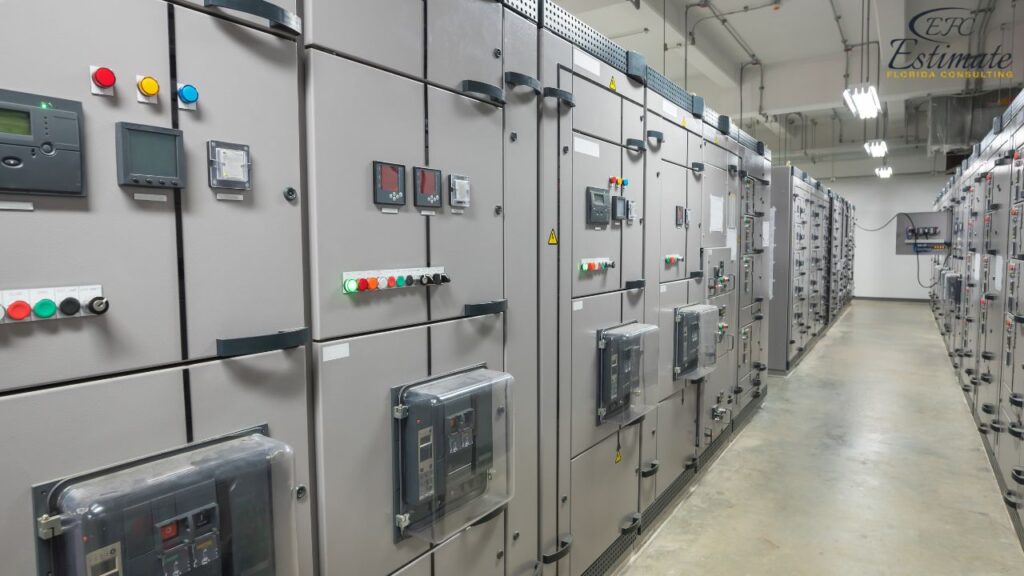
Our comprehensive approach and attention to detail enable us to deliver reliable cost estimations, supporting stakeholders in effective budgeting and decision-making processes for electrical projects in the Jacksonville area.
Essential Electrical Materials: A Comprehensive Inventory for Projects
- Copper Wire: Is a fundamental electrical material used for conducting electricity in various applications, ranging from residential wiring to industrial installations. Its excellent conductivity and durability make it indispensable in electrical systems.
- Circuit Breakers: Are crucial safety devices that protect electrical circuits from overloads and short circuits. They automatically interrupt the flow of electricity when abnormal conditions are detected, preventing damage to equipment and reducing the risk of fire hazards.
- Insulation Materials (e.g., PVC, XLPE): Insulation materials such as PVC (Polyvinyl Chloride) and XLPE (Cross-Linked Polyethylene) are essential for protecting electrical conductors and cables from environmental factors and preventing electrical leakage. These materials provide thermal and electrical insulation, ensuring the safety and reliability of electrical systems.
- Electrical Conduit (e.g., PVC, metal): Electrical conduits are protective tubes used to encase and route electrical wires and cables safely. Available in materials like PVC and metal, conduits shield wiring from damage, moisture, and corrosion while facilitating organized and efficient wire management.
- Switches and Outlets: Are fundamental components of electrical systems, enabling users to control the flow of electricity and connect devices to power sources. These devices come in various types and configurations to suit different applications and aesthetic preferences.
- Lighting Fixtures (e.g., LED bulbs, fluorescent tubes): Lighting fixtures encompass a wide range of products, including LED bulbs, fluorescent tubes, and fixtures for both indoor and outdoor illumination. These fixtures provide lighting solutions for residential, commercial, and industrial spaces, offering energy efficiency and long-lasting performance.
- Electrical Boxes (e.g., junction boxes, outlet boxes): Electrical boxes serve as enclosures for electrical connections and wiring, providing protection against physical damage and maintaining electrical safety. Junction boxes and outlet boxes are commonly used to house connections and devices, ensuring compliance with building codes and regulations.
- Electrical Tape: Is a versatile material used for insulating and securing electrical connections, splices, and repairs. It offers electrical insulation, moisture resistance, and adhesion properties, making it indispensable for electrical maintenance and installations.
- Cable and Wiring Accessories (e.g., connectors, terminals): Cable and wiring accessories include connectors, terminals, and other components used to terminate, splice, and connect electrical cables and wires. These accessories ensure reliable electrical connections and facilitate the efficient installation and maintenance of wiring systems.
- Electrical Panels and Distribution Boards: Electrical panels and distribution boards are central components of electrical systems, serving as hubs for distributing electricity to various circuits and loads. These panels provide circuit protection, control, and organization, playing a critical role in managing power distribution within buildings and facilities.
Estimate Your Electrical Project
Materials of Electrical Breakdown Cost
Electrical Materials | Cost |
Copper Wire | $3 – $5.00 per foot |
Circuit Breakers | $10.00 – $200.00 per breaker |
Insulation Materials (e.g., PVC, XLPE) | $1.00 – $2.00 per square foot |
Electrical Conduit (e.g., PVC, metal) | $2.50 – $5.00 per foot |
Switches and Outlets | $10.00 – $20.00 per unit |
Lighting Fixtures (e.g., LED bulbs, fluorescent tubes) | $50.00 – $100.00 per fixture |
Electrical Boxes (e.g., junction boxes, outlet boxes) | $1.00 – $10.00 per unit |
Electrical Tape | $5.00 – $10.00 per roll |
Cable and Wiring Accessories (e.g., connectors, terminals) | $3.00 – $5.00 per unit |
Electrical Panels and Distribution Boards | $100.00 – $1000.00 per panel |
Labors Cost
At Estimate Florida Consulting offers estimating services for labor costs associated with the Electrical Cost Estimator project in Jacksonville. With a budget of $90,000 allocated for labor expenses, our team meticulously assesses the scope of work, including tasks such as data collection, analysis, and report generation. Factors such as labor rates, project duration, and resource allocation are taken into account to provide accurate cost estimates. Our expertise ensures that labor costs are effectively budgeted for, enabling efficient project management and resource utilization.
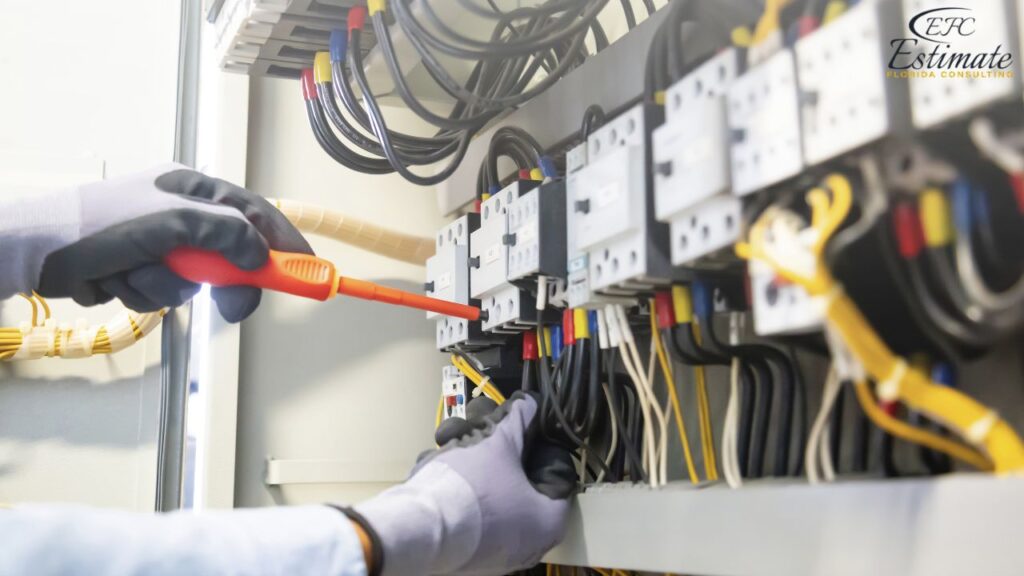
By partnering with Estimate Florida Consulting, stakeholders can rely on comprehensive and reliable estimates tailored to meet the specific requirements of electrical projects in the Jacksonville region.
Labors Breakdown Cost
Task Description | Cost |
Data Collection and Research | $15,000 |
Analysis and Calculation | $20,000 |
Report Generation | $15,000 |
Project Management | $25,000 |
Contingency | $15,000 |
We provide accurate pricing for the ZIP code of your project.
Turnaround time is 1-2 days.
Win More Projects With Us
Project Complexity
The Electrical Cost Estimator project in Jacksonville presents a moderate level of complexity due to various factors. Firstly, the project involves gathering extensive data on a wide range of electrical components and materials, including their costs and specifications. Managing and analyzing this data require meticulous attention to detail and organization to ensure accuracy in cost estimations. Additionally, the project must account for the dynamic nature of the electrical industry, including fluctuating market prices, technological advancements, and regulatory requirements. Moreover, factors such as the scale and scope of electrical installations within the Jacksonville area contribute to the complexity, requiring careful consideration of project timelines, resource allocation, and stakeholder coordination. Successfully navigating these complexities demands a comprehensive understanding of electrical systems, effective project management strategies, and close collaboration among stakeholders involved in the project.
Location-specific Factors
Location-specific factors significantly influence the Electrical Cost Estimator project in Jacksonville. Situated in a coastal area, Jacksonville faces unique challenges such as saltwater corrosion, hurricane risks, and stringent building codes. These factors directly impact the selection of electrical materials and the estimation of project costs. Additionally, the local market dynamics, including supplier availability and labor rates, play a crucial role in determining material costs and project feasibility. Moreover, Jacksonville’ affluent residential and commercial sectors may entail higher standards and expectations for electrical installations, requiring careful consideration of quality and aesthetics in cost estimations. Understanding and accounting for these location-specific factors are essential for producing accurate and reliable estimates tailored to the requirements and conditions of electrical projects in Jacksonville.
Common Challenges and Solutions
Common challenges in the Electrical Cost Estimator project in Jacksonville include fluctuating material costs and complex regulatory requirements. Solutions involve regular market analysis and close collaboration with local authorities to ensure compliance and accuracy in cost estimations.
Fluctuating Material Costs
One common challenge in the Electrical Cost Estimator project in Jacksonville is the volatility of material costs. Factors such as market demand, supply chain disruptions, and fluctuations in raw material prices can significantly impact the overall project budget.
Solution: To mitigate this challenge, our team conducts regular market analysis and monitors price trends for electrical components. By staying informed about market dynamics, we can anticipate price changes and adjust cost estimates accordingly. Additionally, we collaborate closely with reliable suppliers to negotiate favorable prices and secure materials at competitive rates.
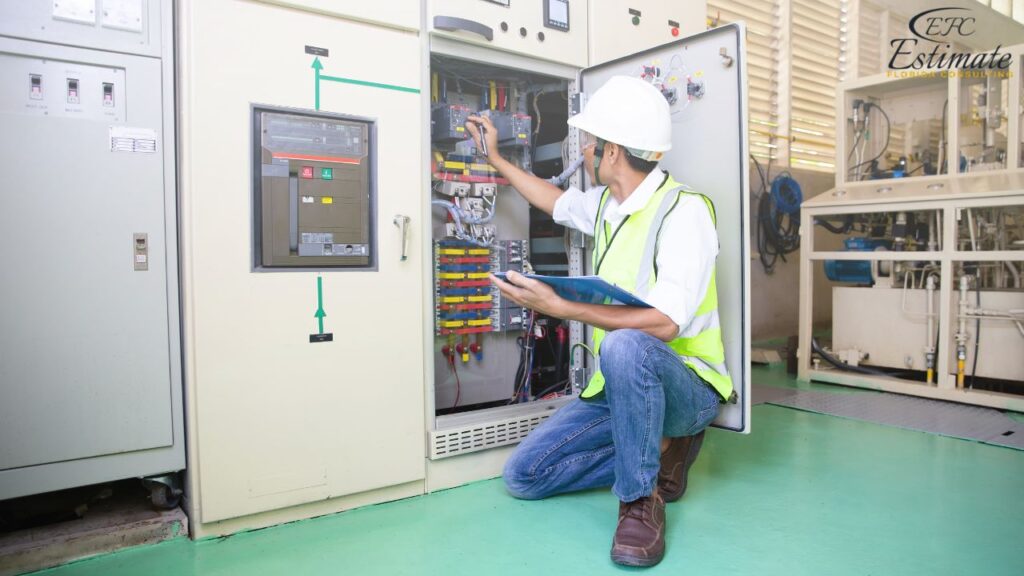
Complex Regulatory Requirements
Another challenge is navigating the complex regulatory landscape governing electrical installations in Jacksonville. Local building codes, zoning regulations, and safety standards must be carefully adhered to, adding complexity to the estimation process.
Solution: Our team conducts thorough research to understand and interpret relevant regulations applicable to electrical projects in Jacksonville. We collaborate with local authorities and regulatory bodies to ensure compliance with all requirements. By staying abreast of regulatory updates and changes, we can accurately incorporate compliance costs into our estimates and minimize the risk of regulatory issues during project execution.
Limited Supplier Availability
Limited availability of suppliers for specialized electrical components can pose challenges in sourcing materials for projects in Jacksonville. This can lead to delays in procurement and potential cost overruns.
Solution: We maintain an extensive network of trusted suppliers and distributors, both locally and regionally, to ensure access to a wide range of electrical materials. By fostering strong relationships with suppliers, we can expedite procurement processes and negotiate favorable terms for our clients. Additionally, we proactively identify alternative suppliers to mitigate risks associated with supply chain disruptions.
Need Template For Your Electrical Business
We provide services for Brochure, Banner, Business Card, Envelope, Invoice, etc.

Technological Advancements
Rapid technological advancements in the electrical industry introduce new products and materials, which may impact cost estimations and project requirements.
Solution: Our team stays informed about emerging technologies and trends in the electrical sector through continuous research and professional development. By leveraging our expertise and industry knowledge, we can assess the suitability of new technologies for specific projects and incorporate them into our cost estimates where applicable. Additionally, we collaborate with industry experts and manufacturers to gain insights into cutting-edge solutions and their potential implications for project costs.
Stakeholder Communication and Expectations
Effective communication with stakeholders, including clients, contractors, and regulatory agencies, is essential for project success. Misaligned expectations or unclear requirements can lead to misunderstandings and delays.
Solution: We prioritize transparent and proactive communication throughout the project lifecycle, ensuring that all stakeholders are informed and engaged. By establishing clear channels of communication and setting realistic expectations from the outset, we foster trust and collaboration among all parties involved. Regular progress updates and consultations enable us to address any concerns or changes promptly, minimizing the likelihood of misunderstandings and ensuring alignment with project goals.
Steps in the Electrical Cost Estimator in Jacksonville
The Electrical Cost Estimator process in Jacksonville involves steps such as data collection, market analysis, cost estimation, stakeholder consultation, and documentation. These steps ensure accurate and reliable estimates for electrical projects in the area.
Data Collection and Research
- The first step in the Electrical Cost Estimator process in Jacksonville involves collecting comprehensive data on electrical components, materials, and market trends. This includes gathering information on prices, specifications, and availability of various electrical products from suppliers and industry sources.
Market Analysis
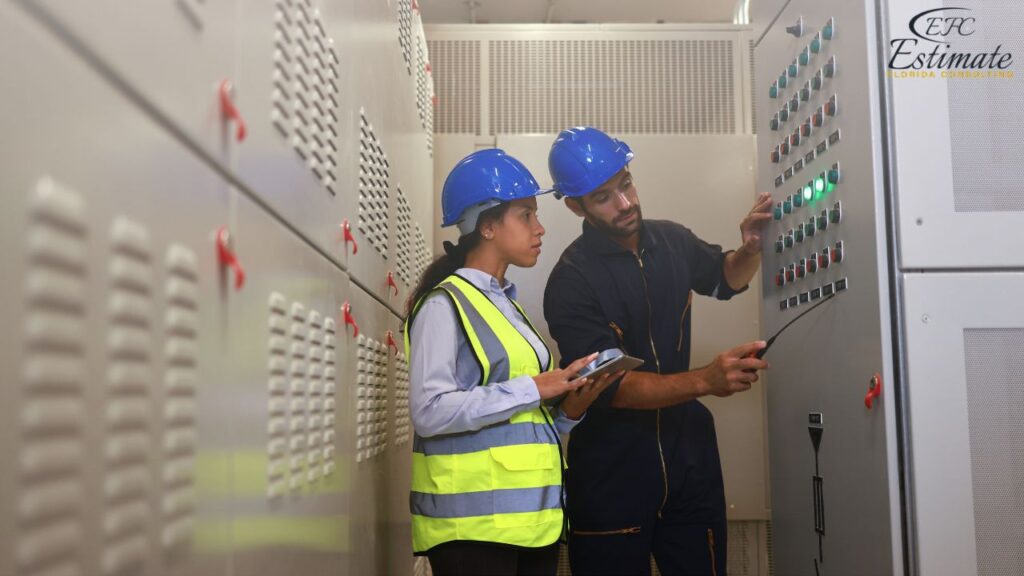
- Following data collection, the next step is to conduct a thorough analysis of the local and regional electrical market in Jacksonville. This involves examining factors such as market demand, pricing trends, supplier dynamics, and regulatory requirements that may impact the cost of electrical materials and labor.
Cost Estimation
- Based on the data collected and market analysis conducted, the cost estimation phase involves calculating the projected costs for electrical components, materials, and labor required for the project in Jacksonville. This includes factoring in variables such as quantity, quality, labor rates, and project specifications to generate accurate cost estimates.
Stakeholder Consultation
- Throughout the Electrical Cost Estimator process, it’s essential to engage with stakeholders such as clients, contractors, and regulatory authorities in Jacksonville. Consultations ensure alignment of project requirements, budget constraints, and expectations, allowing for adjustments and refinements to the cost estimates as needed.
Documentation and Reporting
- The final step involves documenting the findings of the cost estimation process and presenting them in a clear and concise report format. This includes detailing the breakdown of costs, assumptions made, methodologies employed, and any supporting data or analysis. The report serves as a valuable reference for stakeholders and decision-makers involved in electrical projects in Jacksonville.
Are You Looking For?

Fully Insured License
Hire Subcontractor For Electrical Work

Make Informed Design Decisions Showcase Your Design Ideas
Get RenderingCall Us To Discuss More at 561-530-2845
Conclusion
The Electrical Cost Estimator project in Jacksonville is a vital endeavor that facilitates informed decision-making and efficient resource allocation for electrical projects in the region. Through meticulous data collection, market analysis, and stakeholder consultation, our team has developed accurate and reliable cost estimates tailored to the unique requirements and challenges of Jacksonville. By considering factors such as fluctuating material costs, complex regulatory requirements, and technological advancements, we have provided stakeholders with valuable insights and guidance to navigate the intricacies of electrical projects effectively. Moving forward, the insights gained from this project will continue to inform and enhance future endeavors, ensuring the successful implementation of electrical installations and upgrades while adhering to industry best practices and standards in Jacksonville.
We Provide Services for Other Trades in Jacksonville
FAQs
The Electrical Cost Estimator project in Jacksonville aims to provide accurate and reliable cost estimates for electrical projects in the region. It involves gathering data, analyzing market trends, and calculating projected costs for various components and materials used in electrical installations.
The Electrical Cost Estimator is valuable for a range of stakeholders including contractors, engineers, project managers, and property owners involved in electrical projects in DeFuniak Springs. It helps them make informed decisions, plan budgets, and assess the feasibility of electrical installations.
Cost estimates are generated through a systematic process involving data collection, market analysis, and cost estimation techniques. Factors such as material prices, labor rates, project scope, and regulatory requirements are considered to ensure accurate and reliable estimates.
Yes, the Electrical Cost Estimator is designed to accommodate a wide range of electrical projects, including residential, commercial, and industrial installations. It can provide estimates for various components such as wiring, lighting, distribution panels, and more.
The Electrical Cost Estimator may be accessed through online platforms or by consulting with professional estimators and contractors in Jacksonville. For specific project inquiries or customized estimates, it’s recommended to reach out to experienced professionals familiar with the local market and regulations.
Google Reviews



Reach Out To Us
Places to visit if you new in Jacksonville
Catty Shack Ranch Wildlife Sanctuary
Catty Shack Ranch Wildlife Sanctuary operates as a 501(c)(3) non-profit, dedicated to offering a secure and caring forever home to endangered big cats while raising awareness about their challenges both in the wild and in captivity. Here they strictly adhere to a policy of not engaging in breeding, selling, or trading any of their animal residents. Presently, our sanctuary provides a haven for various species including tigers, lions, leopards, pumas, servals, bobcats, foxes, and coatimundis.
Covering 73 acres, Jacksonville Zoo and Gardens stands as the sole zoo in Florida’s northeast region. Housing a diverse population of over 2000 animals and nurturing 1000 plants, it distinguishes itself as one of only seven zoos in the United States boasting an animal wellness team. This dedicated team ensures the provision of optimal care for our animal residents, prioritizing their well-being above all else.
The Cummer Museum of Art & Gardens
Established on November 10, 1961, the Cummer Museum of Art & Gardens originated from the residence of Arthur and Ninah Cummer. Initially, Ninah Cummer’s modest collection of sixty pieces laid the foundation for the museum. Since then, the museum’s permanent collection has flourished, expanding to over six thousand works of art spanning a remarkable eight thousand years of art history.
Big Talbot Island State Park, Jacksonville Florida’s coast, boasts stunning natural beauty and diverse ecosystems. Visitors are drawn to its expansive salt marshes, pristine beaches, and unique coastal dune habitats. The park is renowned for its striking “boneyard beach,” adorned with weathered skeletons of trees shaped by the elements.



